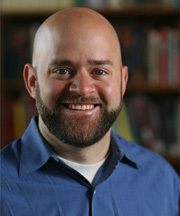Abortion Presentation Coincides with Gorsuch Hearings

It has become an annual tradition at Notre Dame Law School for O. Carter Snead, a professor of law and the William P. and Hazel B. White director of the Center for Ethics and Culture, to deliver a presentation on American abortion law and the U.S. Supreme Court.
On Wednesday, his one-hour overview of the jurisprudence of U.S. abortion law took on a particularly timely significance as it coincided with the Senate confirmation hearings for Supreme Court nominee Neil Gorsuch.
“These issues,” Snead said, “are going to drive a lot of the conversations and debates among the senators as they deliberate over their choice to vote for or against Judge Gorsuch for the Supreme Court.”
One of the factors that differentiates U.S. abortion law from that in other countries is it’s the result of Supreme Court precedent, not the legislative process, he said.
“This wasn’t accomplished by legislation that was the product of compromise and debate and discussion, where the winners win and the losers feel that they got a fair hearing and at least had a chance to persuade their fellow citizens,” Snead said.
Snead described the significance of six key Supreme Court decisions: Roe v. Wade and Doe v. Bolton from 1973, Planned Parenthood v. Casey from 1992, Stenberg v. Carhart from 2000, Gonzales v. Carhart from 2007, and Whole Woman’s Health v. Hellerstedt from 2016.
The court’s Roe v. Wade decision relied on the controversial concept of substantive due process, which is the idea that there are substantive rights that are implied, though not explicitly stated, in the U.S. Constitution. In Roe, the court ruled that restrictions on abortion violate a woman’s right to privacy.
Snead explained that the notion of the right to privacy arose in a 1965 case, Griswold v. Connecticut, which overturned a state ban on contraception on the grounds that it violated the right to marital privacy – a “fundamental” right implied in the Constitution.
“That case was really the most dramatic linchpin that gave rise to the jurisprudence of abortion,” Snead said. “Which is why the Senate Judiciary Committee is asking Neil Gorsuch what he thinks about that opinion. If he expresses skepticism about a right to privacy in Griswold, then everything that comes thereafter is also called into question.”
Snead encouraged students to ask themselves, “How do you know that you’ve identified a fundamental right when it’s not mentioned in the Constitution? And how do you protect against your own temptation to simply invent rights that accord with your view of what public policy should reflect? The courts have grappled with this question for a long time.”
Snead also challenged the position that equated abortion with couples’ other private decisions about family life. “Abortion involves the intentional taking of a human life in process,” he said, adding that the Roe decision created a subhuman status for children in utero.
Gorsuch’s nomination, he said, highlights the fact that elections matter. The composition of the Supreme Court could determine whether Roe and other abortion decisions continue to stand in the years ahead.
But, Snead said in closing, “We have to remind ourselves that, even though we’re locked in a vital struggle for the weakest and most vulnerable among us, we have to show the world – not just tell them, but show them – that the pro-life movement cares more about women and their babies than the abortion rights movement does. And we have to engage this debate vigorously and tirelessly, though always with love and charity and civility – especially for those people that we don’t agree with.”
The event was sponsored by the Jus Vitae Association of Notre Dame Law School.